|
Loading
|
|
|
New State of Chassis:
The Irish Civil War and its background
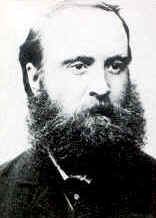
"Parnellism is a simple love of adultery"
"A disillusioned and embittered Ireland turned away from parliamentary politics; an event was conceived; and the race began". So Yeats linked the fall of Charles Stewart Parnell with the Easter Rising of 1916. Betrayed by the promises of its charismatic constitutionalists, Ireland consoled itself with an ancient culture which transformed into a modern revolution.
| 'Tis Ireland gives England her soldiers, her generals too. |
| George Meredith, "Diana of the Crossways", 1885 |
Ireland's grief for Parnell surpassed Nationalism: he was Poverty's idol. Fierce, commanding, consummate in his parliamentary manoeuvres, this Anglo-Irish landowner had turned a puppet Irish party into a formidable force. Holding his arrogant casting vote over Liberal and Tory victories at Westminster, he wrung from Gladstone the Irish Land Act of 1881. This partially realised the eviction and famine-threatened Irish tenants' dream: fair rent, fixed tenure and free sale.
| Before Irish Home Rule is conceded by the Imperial Parliament, England as the predominant member of the three kingdoms will have to be convinced of its justice and equity. |
| Lord Rosebery, House of Lords, 11 March 1894 |
At the height of his power, Parnell was destroyed by being named in the divorce case of his lover of ten years, Kitty O'Shea. The Catholic hierarchy indulged in an orgy of morality; in 1890 he lost the party leadership and died within a year of resisting the disgrace.
"Ulster will fight, and Ulster will be right"
With this inflammatory phrase in 1886 Lord Randolph Churchill cemented a lasting alliance between the Conservatives and the Orangemen, having decided that "if the Grand Old Man [Gladstone] went for Home Rule, the Orange card would be the one to play", The anti-Home Rule riots of that year were the worst in Belfast's history.
After the Liberals regained power in 1905, determined to force Home Rule onto the statute book, the Ulster Unionists began to organise. At their head was the extraordinary advocate, Sir Edward Carson. A Dublin Crown Prosecutor at the time of Parnell's divorce scandal, Carson had prosecuted at Oscar Wilde's trial, and in 1900 had been appointed British Solicitor General.
Thousands signed the Ulster Covenant of 1912, some in their own blood, shed to oppose a new Government of Ireland Bill. In 1913 they formed a private army, the Ulster Volunteer i Force; Carson negotiated with the Kaiser, and 24,000 German guns were run in 1914.
"The Army has killed Home Rule"
Rather than take orders from above to restrain Carson's Unionists, in 1914 sixty British officers at the Curragh Camp threatened their resignations. The Liberal nerve failed; the Government gave way to its own occupying forces and to influential Establishment pressure, finally conceding that a partitioned Ireland might be necessary. Through this new Liberal half-alliance with the former Tory cause, Unionism, the Irish Home Rule constitutionalists were eternally compromised - as were perhaps the Liberals themselves. Carson by contrast served in the war cabinet during World War I and later received a peerage.
A terrible culture is born
| Was it for this the wild geese spread The grey wing upon every tide; For this that all that blood was shed, For this Edward Fitzgerald died, And Robert Emmet and Wolfe Tone, All that delirium of the brave? Romantic Ireland's dead and gone, It's with O'Leary in the grave. |
| WB Yeats, "September 1913" |
In Parnell's long wake, the South turned its energy from political to cultural life. An Irish Renaissance followed, where writers such as Yeats beautifully reinvented an heroic national literature. This cultural revival gained a political counterpart in 1905 when the party Sinn Fein ("Ourselves Alone") pamphleted for independence through peaceful resistance.
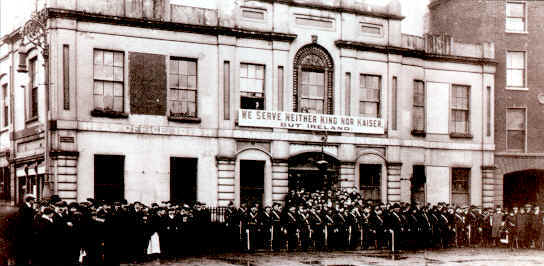
But Dublin now pulsed with movements which thought war "a terrible thing, but not an evil thing". In response to Unionist paramilitary activity, the Irish Volunteers were formed in 1913, co-existing with the secret Irish Republican Brotherhood of Fenian origin. Jim Larkin had orated into existence the Irish labour movement, and after police brutality during the great Dublin transport strike of 1913, workers formed for their protection the Irish Citizen Army, to some the world's first Red Guard.

Strikingly militant were the women, through the Irish Women's Franchise League (1908), the thriving Irish Women Workers' Union (1912) and the Republican Cumann na mBan who were active in the Easter Rising. In fact, Irish women were to gain universal suffrage in 1922, six years before English women: the only good news of that period.
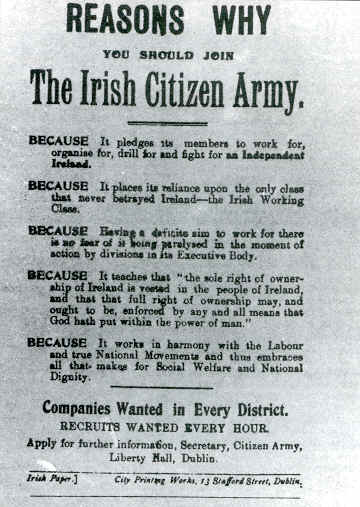
| The misfortune of the Irish is that they have risen prematurely when the European revolt of the proletariat has not yet matured. Capitalism is not so harmoniously built that the various springs of rebellion can of themselves merge at one effort without reverses and defeats. |
| Lenin, on the 1916 Uprising |
"We are going out to be slaughtered"
So spoke socialist James Connolly on Easter Monday 1916. Convinced that a revolutionary blow, or a Nationalist blood sacrifice was needed to inspire full-scale revolution, both Irish Volunteers and Citizen Anny usurped key positions in Dublin and proclaimed an Irish Republic. A thousand died before British troops ended the brave gesture. Deliberately, suspensefully, fifteen leaders were shot at intervals.
| The fight in Ireland has been one for the soul of a race - that Irish race which with seven centuries of defeat behind it still battled for the sanctity of its dwelling place. |
| James Connolly, 1915 |
The executions turned public apathy to outrage, and Ireland slipped steadily into its war of independence between 1919 and 1921. The Volunteers became the Irish Republican Anny and led a highly effective guerrilla campaign, brilliantly organised by the humorous and ruthless Michael Collins.
| I have met them at close of day Coming with vivid faces From counter or desk among grey Eighteenth-century houses. I have passed with a nod of the head Or polite meaningless words, And thought before I had done Of a mocking tale or a gibe To please a companion Around the fire at the club, Being certain that they and I But lived where motley is worn: All changed, changed utterly: A terrible beauty is born. |
| WB Yeats, "Easter 1916" |
The hated Black and Tans, mainly jobless British ex-servicemen, were sent in 1920 to reinforce the Royal Irish Constabulary. Their atrocities were neither authorised nor reprimanded. On "Bloody Sunday", November 1920, the IRA shot 14 British intelligence officers in Dublin. That afternoon the Black and Tans replied by opening fire on a football crowd, killing 12 civilians. But at last, after centuries of risings, the Republicans had an effective revolutionary strategy. By 1921 Lloyd George was willing to negotiate.
"I have just signed my own death warrant"

Thus commented Michael Collins after signing the drafted Anglo-lrish Treaty of 1921. It was the terms of the Treaty which caused the Civil War, creating a heartbroken and murderous ideological split in the Republican cabinet.
For Ireland was not to be a Republic but rather a Free State dominion of the British Empire. Men who had fought brilliantly for complete independence or a workers' state would now be asked to swear allegiance to the Crown in their independent parliament. It is as hard now to imagine Ireland whole as it was then for Republicans to imagine it divided, but the Treaty gave six Ulster counties the right to opt out of the Free State, and they immediately did so.
To many these conditions negated all they had fought for, while Collins argued that the Treaty offered "freedom to achieve freedom" and a northern border still negotiable through a boundary commission. After bitter dissent, the Dail ratified the Treaty - barely. Collins led a stop-gap government into Dublin Castle while British troops began their withdrawal.
Free Staters Die Hard
Those like Collins in the IRA who accepted the Treaty as "a stepping-stone to a Republic" became known as "Free Staters". Those who opposed the Treaty commandeered Dublin's Four Courts in Apri11922, making these the headquarters of the "Die-Hard" or "Irregular" Republican forces.
Whence does this mysterious power of Ireland come?... How is it that she has forced generation after generation to stop the whole traffic of the British Empire in order to debate her domestic affairs? Ireland is not a daughter race. She is a parent nation. Winston Churchill
An assassination, a kidnapping, and Churchillian pressure led Collins to clear out the Four Courts, blasting with borrowed British artillery. The Civil War had begun. Familiar guerilla tactics killed old comrades and, although within several months Collins had died in an ambush, his opponents were clearly losing as their inspired firing proved no match for the big Free State guns.
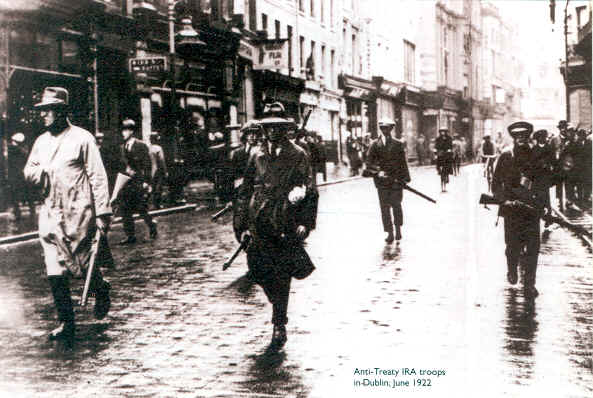
Understanding Irish soldiers well, the Free State government prevented an eternal guerrilla war by empowering the execution of any men found possessing illegal firearms. Over three months some fifty Irregulars were shot, and these terrifying reprisals brought the war to a resigned end. In May 1923 the Republican leader Eamonn de Valera issued his famous order to the Legion of the Rearguard to dump their arms: "Military victory must be allowed to rest for the moment".
Rest for the moment
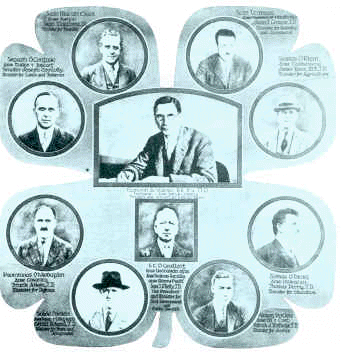
It was an agreement in 1925 between the three involved governments to confirm the existing Northern Ireland border which provoked de Valera to distance himself from the IRA and take constitutional power through his Fianna Fail party. By signing the oath of allegiance without his hand on the Bible he felt able to enter parliament, and in 1932 led his first government of the Free State.
De Valera introduced a new constitution in 1937 which abolished the oath of loyalty, the post of Governor General, and the Unionist-tailored parliamentary structure, the Senate. The special position of the Catholic Church was recognised and divorce forbidden. During World War II he stubbornly guarded Ireland's neutrality, despite an urgent telegram from Churchill immediately after Pearl Harbour: "Now is your chance. Now or Never. 'A Nation once again.'"
On Easter Monday 1949 the Irish government ceremonially inaugurated an Irish republic outside of the British Commonwealth, while in the same year Westminster legislated that Northern Ireland would never leave the United Kingdom without its own parliamentary consent.
|
The Government has been accused by some in the press and media of undermining their freedom to report what they want. To answer that charge, perhaps I can refer to a letter I received from the mother of a young serviceman who was murdered by the IRA. She said - and I quote: "Where is the freedom of the press, I hear them cry. Where is my son's freedom?" Yes, My Lord Mayor; some of these measures do restrict freedom, but those who choose to live by the bomb and the gun and those who support them cannot in all circumstances be accorded exactly the same rights as everyone else. |
| Margaret Thatcher, speech at the Lord Mayor's Banquet, November 1988 |